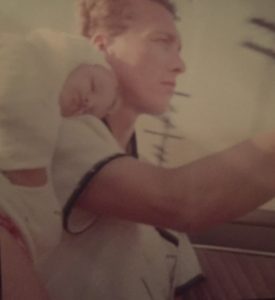Loss.
There has been so much loss in recent weeks, in my family, and our community. My dad passed on Thursday night, June 15th. In the four weeks since he transitioned beyond the veil of Earthly consciousness, I have connected with various posts and websites that have provided thoughts and suggestions for healing through the process of grief. I hope they will help you as they have me.
︶⁀°• •° ⁀︶
Victor Hugo’s last words.
[The Independent]
His belief in the necessity of turning one’s empathy with fellow man into real change was most succinctly put in his last words however, written as a note two days before his death from pneumonia:
“To love is to act.”
~
Ram Dass:
It is important, as we get older, to learn how to grieve. Although this may sound self-evident, experience has taught me that it is not. In a culture that emphasizes stoicism and forward movement, in which time is deemed “of the essence,” and there is little toleration for slowness, inwardness, and melancholy, grieving – a healthy, necessary aspect of life – is too often overlooked. As we get older, of course, and losses mount, the need for conscious grieving becomes more pronounced. Only by learning how to grieve can we hope to leave the past behind and come into the present moment.
~
Life is about loss and letting go. ‘…all life is entwined with loss.’
[The Guardian]
Tim Lott:
‘The most resonant truth about children is that they disappear. Slowly, gradually, but eventually. Children in that sense are clocks, marking the passage of time with each new stage of growth. To see a child disappear – or rather, to become aware in any acute way of their disappearance – is to become aware of losing something you have loved more than anything you have loved in your life before, or will again.
Watching our children grow is – in an odd, inverted way – like watching our parents grow old and die. If we mourn in both cases it is perhaps because we are also weeping for ourselves – for our own impermanence, for our own mortality. For we also mark time, less visibly, in our own bodies.
As our children grow, we are also mourning the passing of a role – of ourselves as protectors, indispensable, loved passionately with the need and rose-coloured tints only children and infatuated lovers can offer us.
Think of how these processes of mourning are recorded in song, from Slipping Through My Fingers All the Time (Abba), Brown Eyed Girl (Van Morrison) to the even more heartbreaking Turn Around. My favourite version, by Nanci Griffith, reduces me to tears (and that’s not just a casual expression – it really does make me weep). And yet I go back to the song again and again. Why? What are the tears for? And why do I court them?
They are tears, partly, for loss. As such, they are simply sentimental – or at least, unnecessary. Because all life is entwined with loss. Transience is what makes life beautiful and worth living. All that comes and goes away is the heart of beauty. Children are simply the most vivid and meaningful examples of evanescence.
So, there are many kinds of tears. Perhaps we weep at a sad song about children growing up partly because we perceive the process as tragic. But they may also be tears of the recognition of beauty, because this changing is profound, and brings us most closely into touch with the heart of life itself.
In any case, the idea that we are losing love as our children grow is not true. The love I feel for my two eldest daughters, in their 20s now, is undiminished with the passing of time. I don’t get to express it so much, and they don’t feel the need to. They are independent. And that is a job well done as far as I am concerned. Yet when I look at them sometimes, I feel exactly the same emotion I felt when they were barely walking, and helpless.
We do not lose our children – not unless we are very unlucky, or very bad parents, or they are very atypical children. If our desires to hold on to our children really took root, and were acted out, it would be a disaster. This is doubtless the fate of many over-parented children. Such children could not emotionally leave home, ever.
We must let go, and then let go and then let go. And eventually they, too, must let go, as their parents pass out of this life, at first gradually then entirely and finally. I have already “lost” my children many times – as babies, as toddlers, as infants. They are always being made anew – and yet are always, at some deep level, the same. Parallel changes are happening to me, too, if I am doing it right. That is, I am always losing my children only in the sense that I am always losing myself.
For if I am static as a fully grown adult, then I am doing something wrong. I am holding on to myself too tightly, just as some parents hold on to their children too tightly. Life, yes, is loss and letting go. But without that loss and letting go, it would be like a plastic flower. Indestructible, but ultimately valueless.‘
~

Leave a Reply